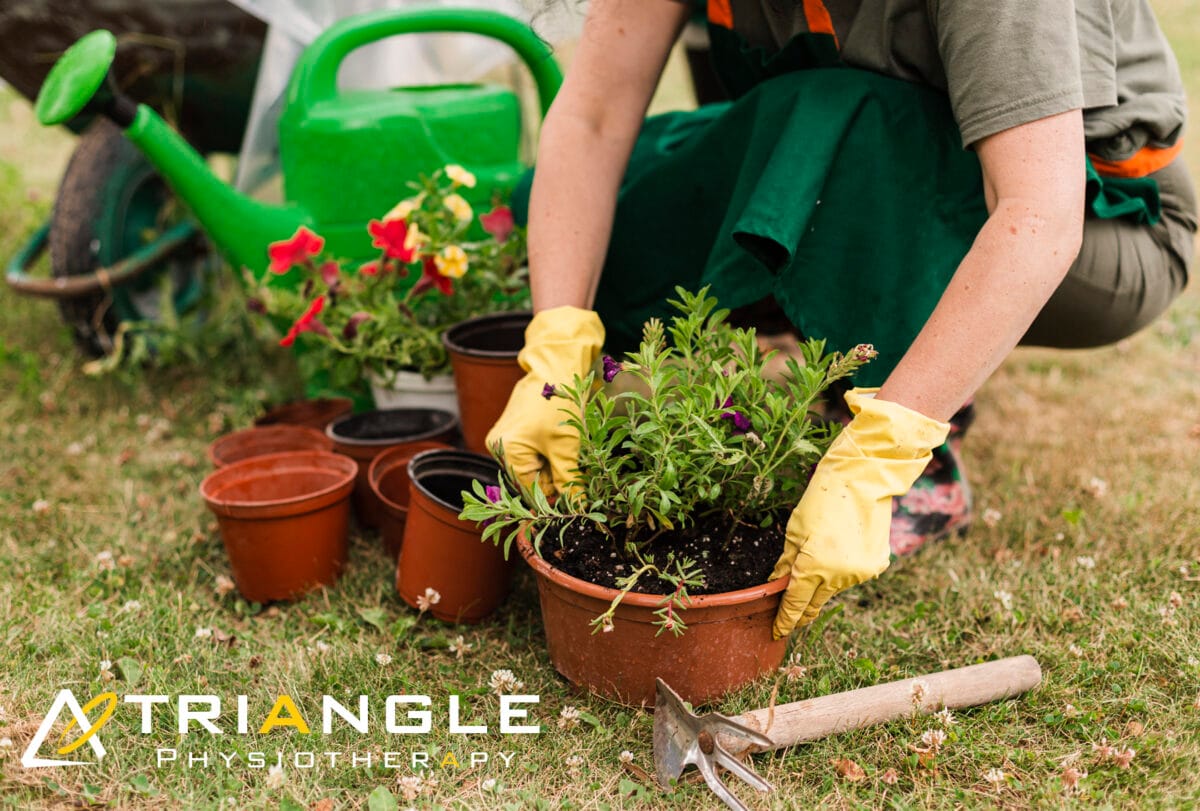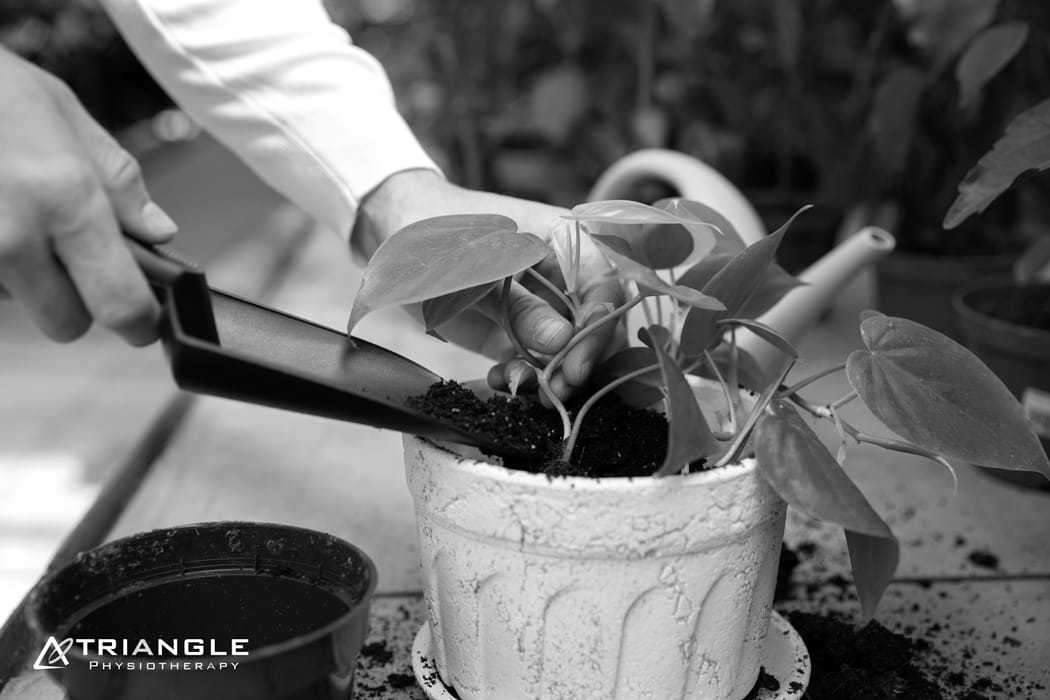Gardening is a favourite activity for many people as the summer season arrives. As healthcare professionals, we understand the importance of gardening in promoting physical health and well-being.

Here are some gardening tips to ensure a safe and enjoyable experience:
- Warm-Up Exercises: Treat gardening as a physical activity and warm up before starting. Perform gentle stretches for your back, shoulders, and legs to prepare your muscles for the tasks ahead.
- Maintain Good Posture: Pay attention to your posture while gardening. Bend from your knees and hips, not your back, to avoid strain. Avoid prolonged periods of bending or kneeling; take breaks and change positions frequently.
- Use Proper Lifting Techniques: When lifting heavy objects like bags of soil or pots, bend your knees, keep the object close to your body, and lift with your legs, not your back. Avoid sudden twisting movements.
- Choose Ergonomic Tools: Invest in high-quality, ergonomic gardening tools that reduce strain on your joints and muscles. Look for tools with padded handles and adjustable lengths.
- Start Slowly: If you’re new to gardening or haven’t done it in a while, start with lighter tasks and gradually increase your gardening time and intensity to build endurance and strength.
- Alternate Activities: Vary your gardening tasks to avoid overusing specific muscles. Switch between planting, weeding, and watering to distribute the workload.
- Garden at Waist Height: If possible, create raised garden beds or use elevated planters to reduce the need for bending and kneeling.
- Use Knee Pads or Cushions: Protect your knees by using knee pads or cushions when kneeling on the ground.
- Stay Hydrated: Gardening can be physically demanding, so remember to drink water regularly to stay hydrated, especially on hot days.
- Take Breaks: Listen to your body and take breaks as needed. Use your break time to stretch and relax.
- Ask for Help: If a task seems too challenging or requires heavy lifting, don’t hesitate to ask for assistance from family members or friends.
- Cool Down and Stretch: After gardening, take a few minutes to cool down and stretch your muscles to prevent stiffness and promote flexibility.
What are some common gardening postures that can lead to discomfort or injury?
Several gardening postures can lead to discomfort or injury if not done with proper form and technique. Some common ones include:
- Bending from the Waist
- Kneeling on Hard Surfaces
- Repetitive Twisting
- Overreaching
- Incorrect Lifting
How can I avoid discomfort while gardening?
To avoid discomfort while gardening, consider the following tips:
- Use Proper Posture
- Take Breaks
- Use Knee Pads or a Kneeler
- Alternate Tasks
- Garden at Waist Height
- Use Ergonomic Tools
- Lift Properly
- Stretch Before and After
Can gardening worsen pre-existing musculoskeletal conditions?
Yes, gardening can exacerbate pre-existing musculoskeletal conditions if proper precautions are not taken. People with conditions like osteoarthritis, back pain, or joint issues may be more susceptible to discomfort or injury while gardening. However, with proper body mechanics, adaptive tools, and awareness of limitations, gardening can still be enjoyed safely. It’s essential for individuals with pre-existing conditions to consult their physiotherapist or chiropractor before engaging in gardening to get personalized recommendations and precautions.
I often experience neck and shoulder pain after a day of gardening. How can I prevent this discomfort?
Neck and shoulder pain after gardening can result from poor posture and overuse of certain muscles. Here’s how to prevent discomfort:
- Maintain Proper Posture: Keep your head aligned with your spine and avoid prolonged forward head posture while working in the garden.
- Avoid Overreaching: Use gardening tools with extended handles to reduce strain on your shoulders. Avoid overreaching when pruning or planting.
- Take Frequent Breaks: Schedule regular breaks during gardening to rest your neck and shoulder muscles.
- Incorporate Shoulder Exercises: Perform shoulder-strengthening exercises recommended by a physiotherapist to improve muscle endurance and stability.
- Warm-Up Before Gardening: Engage in light shoulder and neck stretches to prepare your muscles for gardening tasks.
- Use Proper Lifting Techniques: Lift objects close to your body and use your leg muscles to minimize strain on your neck and shoulders.
- Ice and Heat Therapy: Apply ice to sore areas after gardening to reduce inflammation, and use heat packs to relax tense muscles.
Can gardening worsen my existing back condition? Can physiotherapy help?
Gardening can potentially worsen existing back conditions if proper precautions are not taken. Physiotherapy can certainly help to alleviate back pain and prevent it from affecting your gardening game. Individuals with back issues should consider the following:
- Consult a Physiotherapist: Seek advice from a physiotherapist to assess your back condition and receive personalized recommendations for gardening.
- Avoid Heavy Lifting: Refrain from lifting heavy objects that could strain your back. Use lightweight containers and gardening tools.
- Choose Low-Impact Tasks: Opt for low-impact gardening activities such as container gardening or raised beds to minimize strain on your back.
- Use Assistive Devices: Consider using gardening tools with ergonomic designs or assistive devices to reduce stress on your back.
- Pace Yourself: Take frequent breaks and limit the duration of gardening sessions to avoid overexertion.
- Engage in Back Exercises: Perform back-strengthening exercises prescribed by your physiotherapist to improve the stability and flexibility of your spine.
How do I book an appointment at a Physiotherapy Clinic near me?
Click HERE to book an appointment with a physiotherapist or chiropractor at one of our eight locations.
- Physiotherapy Etobicoke – Triangle Physiotherapy Etobicoke
- Oakville Physiotherapy Clinic – Triangle Physiotherapy Oakville
- Physiotherapy North York – Triangle Physiotherapy North York
- Mississauga Physiotherapy Clinics – Triangle Physiotherapy Mississauga
- Downtown Physiotherapy Clinics – Triangle Physiotherapy King West
- Uptown Physiotherapy Clinics – Triangle Physiotherapy Lawrence Park
- Physiotherapy Clinic Downtown Toronto – Triangle Physiotherapy Queens Quay
- Physiotherapy Clinics Mississauga – Triangle Physiotherapy Erin Mills
“Gardening is a rewarding activity, but it’s important to stay injury-free during the summer. Triangle Physiotherapy offers expert services across the GTA, including Physiotherapy in Etobicoke, Oakville, North York, Toronto, Lawrence Park, Queens Quay, Erin Mills, Mississauga, and Liberty Village. Our experienced physiotherapists can help you prevent and manage injuries, ensuring that you can enjoy your gardening activities all season long.”




